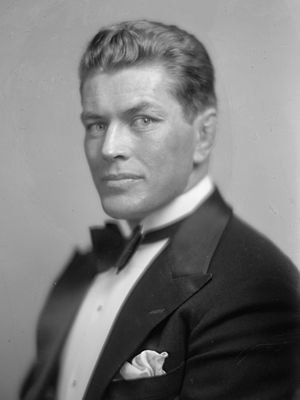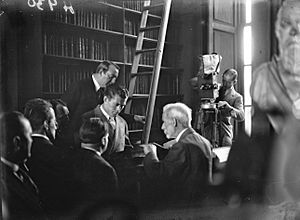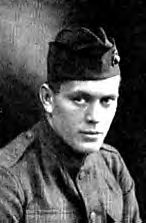Gene Tunney facts for kids
Quick facts for kids Gene Tunney |
|
|---|---|

Tunney c. 1925
|
|
| Statistics | |
| Real name | James Joseph Tunney |
| Nickname(s) | The Fighting Marine |
| Rated at |
|
| Height | 6 ft 0 in |
| Reach | 76 in |
| Born | May 25, 1897 New York City, U.S. |
| Died | November 7, 1978 (aged 81) Greenwich, Connecticut, U.S. |
| Stance | Orthodox |
| Boxing record | |
| Total fights | 88 |
| Wins | 82 |
| Wins by KO | 49 |
| Losses | 1 |
| Draws | 4 |
| No contests | 1 |
James Joseph Tunney (born May 25, 1897 – died November 7, 1978) was an American professional boxer. He competed from 1915 to 1928 and became a world champion.
Tunney was the world heavyweight boxing champion from 1926 to 1928. He also held the American light heavyweight title twice. He was known for being a very smart and skilled boxer. Tunney had a big rivalry with Harry Greb, fighting him five times. He won three of those fights, lost one, and had one draw. Tunney also famously beat Jack Dempsey twice. Their second fight in 1927 is one of the most famous boxing matches ever, known as The Long Count Fight. Tunney retired from boxing in 1928 as an undefeated heavyweight champion. After his last win, The Ring magazine named him their Fighter of the Year.
Contents
Early Life and Inspiration
Gene Tunney's mother, Mary Lydon, came to the United States from Ireland. She met John Tunney in New York City, and they got married. They had seven children.
From a young age, Gene was inspired by President Theodore Roosevelt. Roosevelt encouraged people to be physically fit and strong. This inspired Tunney to focus on his own physical health and strength.
Boxing Career Highlights
Gene Tunney had a long and successful boxing career. He fought 68 official professional fights. He only lost one of these fights, which was to Harry Greb when Tunney was a light heavyweight. He also had many other fights where the winners were decided by newspaper reporters, and he never lost any of those.
Tunney was known for being a very skilled boxer. He was especially good at defense, meaning he was hard to hit. Besides beating the famous Jack Dempsey, Tunney also defeated other great boxers like Tommy Gibbons and Georges Carpentier.
Before he became a professional boxer, Tunney was a champion in the U.S. Expeditionary Forces. In 1921, he even spent a winter working as a lumberjack in Canada. He did this to get stronger and prepare for his boxing career.
Tunney also tried acting for a short time. He starred in a movie called The Fighting Marine in 1926. Sadly, no copies of this movie are known to exist today.
His achievements were recognized with many honors. He was the very first boxer to be named The Ring magazine's Fighter of the Year in 1928. Later, he was inducted into the World Boxing Hall of Fame in 1980. He also joined the International Boxing Hall of Fame in 1990 and the United States Marine Corps Sports Hall of Fame in 2001.
Military Service
Tunney joined the Marine Corps during World War I. He served in France and later in Germany. He didn't see combat during the war. Instead, he was part of the Marine boxing team. He became the U.S. Expeditionary Forces champion.
After the war, Tunney left active duty but stayed in the Marine Corps Reserve. He eventually reached the rank of Major.
During World War II, Tunney returned to service. He joined the U.S. Naval Reserve to help set up a physical fitness program for student pilots. He led the Navy's fitness program throughout the war. He was promoted to Captain before he retired after the war. For his service, he received several medals.
Personal Life and Family
In 1928, Gene Tunney married Mary "Polly" Lauder. She came from a very wealthy and well-known family. Her grandfather was George Lauder, a business partner of the famous industrialist Andrew Carnegie.
According to a book about him, Tunney promised Polly he would stop boxing. He defended his title only one more time after his second fight with Dempsey. This last fight was against Tom Heeney of New Zealand.
After retiring from boxing, Gene and Polly lived in Stamford, Connecticut. They had four children. One of their sons, John Varick Tunney, became a U.S. Representative and later a U.S. Senator for California.
Later Years and Legacy
Gene Tunney passed away on November 7, 1978, at the age of 81. He died in Greenwich, Connecticut, after suffering from a circulation problem. He was buried in Stamford, Connecticut.
Tunney's Boxing Style

Gene Tunney was known as a "thinking fighter." He liked to make boxing a strategic game, like chess. This was different from other popular boxers of his time, like Jack Dempsey and Harry Greb, who were known for their powerful punches.
Tunney's style was influenced by other smart boxers like James J. Corbett and Benny Leonard. He was very good at moving around the ring and using his left jab to keep opponents away. He would carefully watch his opponents from the start of a fight. He liked to stay on the outside and stop attacks, then use quick counter-punches. In his fights against Jack Dempsey, you can see his style: his hands were held low for more power, he moved his feet quickly, and he used fast, accurate punches.
A remarkable fact about Tunney is that he was never knocked out in his entire career. He was only knocked down once, which happened in his second fight with Dempsey during the famous "Long Count." This makes him one of only a few heavyweight champions to retire without ever being stopped by an opponent. He also retired as the champion, a rare achievement. Tunney also managed to get revenge for his only loss against Harry Greb, making him one of the few heavyweight champions to have beaten every opponent he faced professionally.
The Tunney Cup
In 1928, the U.S. Marine Corps gave a special challenge cup to the Royal Marines of the United Kingdom. This was a sign of friendship between the two military groups. The Royal Marines named the trophy the "Tunney Cup" in honor of Gene Tunney, who was a Captain in the U.S. Marine Corps at the time. He helped present the trophy. This cup is still competed for by Royal Marines soccer teams.
Images for kids
See also
 In Spanish: Gene Tunney para niños
In Spanish: Gene Tunney para niños
 | Bessie Coleman |
 | Spann Watson |
 | Jill E. Brown |
 | Sherman W. White |





